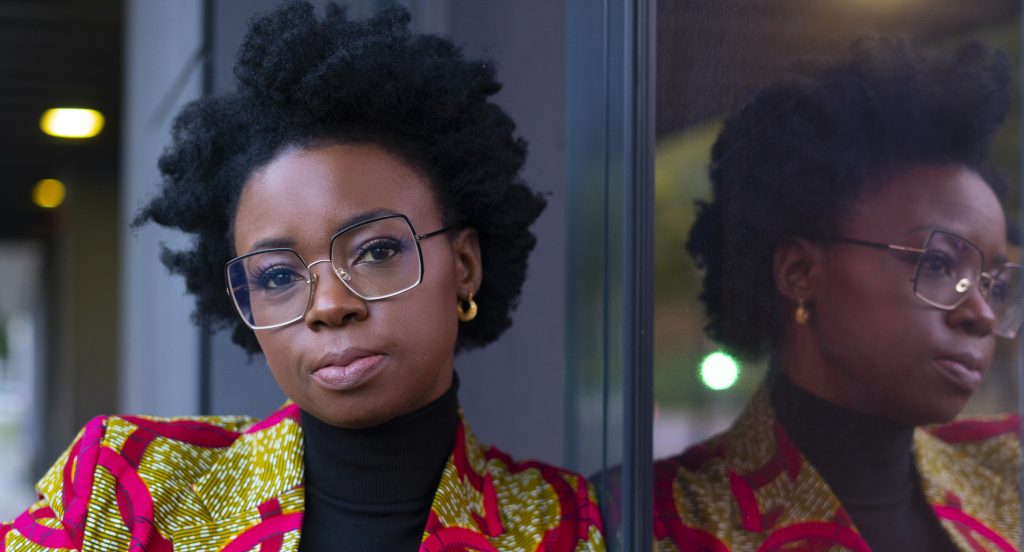Have you ever wondered what it truly means to revolutionize leadership in a world that never stops moving? Imagine if the key to exceptional leadership wasn’t hidden in strategy meetings or quarterly numbers, but in the profound, untapped experiences of the human soul.
Multiple Award winning Lunia Hara, a Director of Project Management and a celebrated advocate for empathetic leadership, is not just envisioning this future, she’s actively creating it. What inspired her to become a pioneering force in a field where empathy often takes a backseat to profit? What fuels her mission to blend cultural empathy with innovative leadership strategies, crafting environments where every voice is heard and valued?
In this exclusive interview, we plunge into the heart of Lunia’s remarkable journey, from her groundbreaking steps onto the global stage to her tireless efforts in championing a leadership style that prizes empathy and human connection. Uncover the pivotal experiences that have shaped her path, revealing how she transitioned from a passionate advocate to a transformative leader.
As she shares her profound insights, you’ll be drawn into a narrative that not only challenges conventional leadership norms but also offers a refreshing perspective on leading with purpose and integrity in today’s complex landscape. This isn’t just an interview, it’s a window into a revolutionary approach to leadership that could reshape your expectations and ignite a new way of thinking.
Join us as we explore her story and the transformative impact of her work, and prepare to be inspired by a leader whose vision for change is as profound as it is actionable.

Let’s start with who you are. Different people know you with different skillsets—as the advocate driving cultural change with empathy, a LinkedIn TopVoice, a TEDx Speaker, Changemaker, and many more. Who do you say you are? What’s your story before all this?
I am woman shaped by diverse cultural experiences and a commitment to empathy and change. Growing up in a small village in the eastern province of Zambia, where we had neither water nor electricity, taught me resilience and the value of community. Moving to Berlin at the age of ten exposed me to a new world, broadening my perspective and making me more open-minded. This journey of navigating different cultures has profoundly influenced my approach to leadership and advocacy.
Before these roles, my background and experiences instilled in me a deep understanding of how identity and cultural context shape our actions and beliefs. This awareness drives my work as an advocate for empathic leadership. My story is one of embracing diverse cultural influences and using that understanding to drive positive change in various spheres of life.
Can you share the most pivotal moment in your career that led you to focus on empathic leadership and cultural change?
It was more of a cumulative experience than a single moment. Building a career as a Black woman in a predominantly white-dominated world involved navigating many challenges, often through trial and error. I encountered supervisors who were more focused on their own careers than on supporting me. The pivotal shift occurred following George Floyd’s death and the widespread global protests. This moment prompted me to reflect on my own contributions to creating a better world. It became clear that empathic leadership and driving cultural change were crucial not only for supporting others but also for fostering a more inclusive and equitable environment.
How do you define empathic leadership, and why do you believe it is crucial in today’s organizational landscape?
Empathic leadership centers on the needs and well-being of employees, aligning their challenges and goals with organizational objectives. It focuses on both personal and professional development, fostering deeper connections with the company, the team, and leadership.
The core aspects of empathic leadership are:
- Humanity: Placing the individual, with their needs, challenges, and goals, at the center of leadership.
- Feedback: Providing regular, honest, and open feedback to support individual growth and enhance the feedback culture.
- Openness: Demonstrating vulnerability, admitting mistakes, and maintaining transparency and authenticity to build strong communication.
- Self-Reflection: Understanding oneself and one’s values to better comprehend and advocate for others.
What are some practical steps leaders can take to shift from traditional leadership methods to a more empathic approach that better meets employees’ needs?
Empathetic leadership is primarily a matter of one’s own attitude. It’s a conscious choice.
- It’s important to understand your own emotions, strengths, weaknesses, and triggers, and how your feelings and behavior can affect others. The ability to continuously self-reflect is a crucial component of empathetic leadership. The better you know yourself, the better you will understand others. Ask your team for feedback on your work as well.
- Show genuine interest in the development and needs of others. It’s important to give employees constructive and honest feedback.
- Be open about your own mistakes and weaknesses. This contributes to psychological safety in the workplace. Your team will learn that they can do the same.
- Your employees know what they need. Ask more often: What do you need from me? How can I best support you?
In one of your TEDx talks, you mentioned, “Leadership is in a crisis and employees do not get the leadership they need and deserve.” What do you believe are the root causes of the current leadership crisis?
The current leadership crisis stems from outdated leadership models and lack of empathy and compassion. Many leaders are not fully aware of the impact of social media and the shift to a knowledge-based society. Today, employees have access to influential thought leaders and coaches worldwide through social media, which was once reserved for executives due to its high cost. This widespread access to coaching and insights changes people’s expectations. They become more aware of what good leadership should look like and understand how poor leadership can negatively impact their mental health. Compared to past generations, employees are no longer willing to compromise on their health and work-life balance. However, many leaders continue to prioritize results over understanding and supporting their employees, which creates a disconnect. Focusing solely on immediate goals often neglects long-term employee well-being.

How do you see the future of work evolving with the integration of AI, and what role does empathic leadership play in preparing teams for these changes?
The future of work will be significantly shaped by AI, automating routine tasks and creating new opportunities for innovation. I hope one outcome is that we can all spend more time on activities we love, focusing on creativity, innovation, and problem-solving rather than repetitive work. As AI transforms workflows, empathic leadership will be crucial in guiding teams through these changes. By fostering open communication, addressing concerns, and emphasizing continuous learning, empathic leaders can help their teams adapt to new technologies and the cultural shifts that come with them. They also play a key role in maintaining morale and ensuring that AI advancements align with human values and organizational goals.
What is the most important message you hope to convey to leaders and organizations about the importance of cultural change and empathy?
Go with the times! Today’s workforce increasingly values life-work balance and seeks to live fully in the present rather than postponing their desires. While options like home office are important, employees also crave meaningful work and expect their employers to take social responsibility seriously. Empathetic leadership is crucial in addressing these needs by aligning them with organizational goals and projects, ensuring that both employees and the organization thrive.
How has traveling influenced your perspective on leadership and empathy?
Traveling has been invaluable in broadening my mind and helping me see things from different perspectives. Last year, I attended the PALEDEC event in Dakar, Senegal, where I presented on Empathetic Leadership. Initially, I was concerned that my topic might not resonate in a country with high unemployment, but those concerns were quickly dispelled. I took the time to engage with the local people and culture, including having lunch with fishermen on the beach who shared their struggles with me. This experience reinforced my belief that leadership extends beyond managing individual employees. It also involves taking responsibility for the environment and the well-being of all people affected by the supply chain. A future leader should strive to achieve performance without harming the environment or people, regardless of where they live in the world. To me, that is true success.
What are your future goals in terms of promoting empathic leadership and driving cultural change within organizations?
I aim to write a book to make my knowledge on empathic leadership accessible to a broader audience. Additionally, I want to bring this topic to the international stage because I am convinced that empathetic leadership can be a key part of the solution to many problems we face today in companies and society.
As a director of project management and advocate of empathic leadership, how do you ensure that your team members feel empowered and valued amidst technological advancements like AI?
At this current phase, I encourage my team to embrace AI and learn it as quickly as possible. Generative AI is becoming basic knowledge, regardless of the job you do. I show them how AI can complement their work in a meaningful way and do not stir up fear, as it is unjustified. I also lead by example, continuously learning about AI myself to show that we are all in this together. Fortunately, I work at Diconium. They take training for their employees very seriously and support with trainings.
You are a person of great influence. If you could start a movement that would bring the most amount of good to the most amount of people, what would that be?
I am a movement! (Laughs) What I do is not for myself. Empathic leadership is a new way of looking at the world and how we interact with each other, which has a major impact not only on individuals but also on society. The people we lead are the same people you meet at the bakery, in the supermarket, or on the streets. If leaders treat them well and learn to empower them, we will have fewer problems. Everything is connected, and we have to think about leadership on a larger scale. Empathetic leadership is a lifestyle, and I strive to live by its principles as best as I can. I hope to inspire more people to understand and adopt this approach.
Off-topic, but I’m curious. As someone steering the ship, what thoughts or concerns often keep you awake at night? How do those thoughts influence your daily decision-making process?
I hardly experience that anymore. I used to have it a lot more in the past: sleepless nights due to delayed projects, before a meeting with a difficult client or supervisor, money issues, or relationship issues. I’ve learned to manage my thoughts better. It’s the fear of an anticipated future that keeps you awake, but in most cases, fear is not real. I try not to ruin my present moment for something that might happen tomorrow. It took a lot of effort to get my mind to where it is now. Fear is a trap—once you’re in it, you focus on the emotion instead of making a decision, finding or working on a solution. Decide or focus on the solution, even if it’s not the best, and trust that things will go well.
Looking back, what advice would you give to your younger self if you were starting your career anew?
Honestly, I dislike this question. Why should I go back and in the past and give myself an advice? What happened shaped me into who I am today. Yes, self-reflection is valuable and can inspire others, but I would prefer to reframe the question: Imagine you are 70 or 80, what would you like to tell yourself?

Okay. What do you want to tell yourself when you are 80?
You were the little girl from an unknown little village. Often underestimated by others. You didn’t let your fears or others block your way. You wrote books, inspired people, and raised awareness for more empathy, compassion and humanity in the working world and society. You contributed to making the world better place. Good job!
Congratulations on being recognized as Women of the Year 2024 by Beyond Gender Agenda! How has this accolade influenced your perspective on gender equality in your professional field?
Thank you! As a Black woman, I am acutely aware of the importance of intersectionality in our pursuit of equality. While it is crucial to focus on gender equality, we must also ensure that our efforts do not inadvertently leave behind other marginalized groups. In a society with a white majority, there is a risk of predominantly favoring white women if we are not vigilant. It is essential to learn from past mistakes and strive for an inclusive approach that considers the diverse experiences of all women.
I firmly believe that women today have the capacity to advocate for both gender equality and broader inclusion. By embracing intersectionality, we can create a more equitable and empathetic workplace for everyone. This accolade motivates me to continue championing these values and working towards a future where every individual, regardless of their background, has the opportunity to thrive.
What hobbies or activities do you enjoy outside of work that help you unwind and stay grounded?
I do boxing, which I highly recommend. It’s both mentally and physically challenging. Additionally, I go to the gym regularly. I also enjoy dancing by myself in the mornings as an easy way to flood my body with endorphins. Besides these activities, I have a deep appreciation for opera.
What advice would you give to young professionals, especially women, who aspire to leadership roles in agile environments? How can they navigate challenges and seize opportunities?
- Define your vision: Clearly outline who you want to be and plan your actions to align with this vision. Work towards your vision step by step.
- Invest in personal growth: Confidence is crucial for stepping into leadership roles. You will need to advocate for your own career and values, but you will sometimes have to fight for others as well.
- Make yourself seen: Don’t wait to be noticed. Take proactive steps to showcase your readiness for leadership. For instance, I remember feeling overlooked and frustrated, so I approached my supervisor and expressed my desire for career advancement. Three months later, I secured a leadership position. Sometimes, assumptions like “mothers don’t want a career” can hinder your progress, so it’s important to assert your ambitions clearly.
How can our readers learn more about your work and connect with you for further insights and guidance?
You can find most of my work on LinkedIn, where you can follow me or send a message for further insights. I’m also active on Instagram and Facebook.

